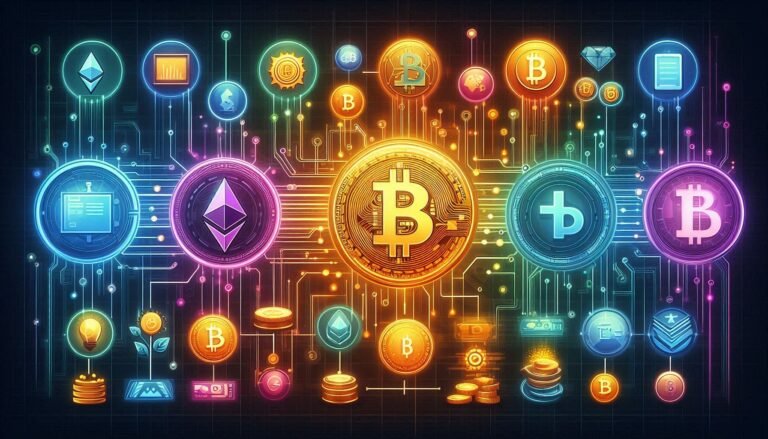The Business Opportunities in GameFi Blockchain

Developing Blockchain-Based Games that Reward Players with Crypto and NFTs
In recent years, the gaming industry has witnessed a significant transformation with the advent of blockchain technology. This innovative technology has given rise to a new genre known as GameFi, which combines gaming and decentralized finance (DeFi). GameFi allows players to earn rewards in the form of cryptocurrencies and non-fungible tokens (NFTs) while enjoying their favorite games. This article explores the business opportunities within the GameFi sector, highlighting how entrepreneurs can capitalize on this burgeoning market.
Understanding GameFi
GameFi is a fusion of gaming and finance, where players can earn real-world value through their in-game activities. Unlike traditional games, where players invest time and money without any tangible returns, GameFi offers a unique business model that incentivizes players to engage more deeply. By integrating blockchain technology, developers can create games that allow players to own, trade, and sell in-game assets as NFTs, providing a new revenue stream for both players and developers.
The Rise of Blockchain Gaming
The rise of blockchain gaming can be attributed to several factors:
Ownership of Assets: In traditional games, players do not truly own their in-game assets. Blockchain technology allows players to have true ownership of their items, which can be traded or sold on various marketplaces.
Play-to-Earn Model: The play-to-earn model has gained immense popularity, enabling players to earn cryptocurrencies by completing tasks, winning battles, or participating in events.
Decentralization: Blockchain games are often decentralized, meaning that no single entity controls the game. This fosters a sense of community and trust among players.
Interoperability: Many blockchain games allow assets to be used across different games, enhancing the value of in-game items.
Business Models in GameFi
The GameFi sector presents various business models that entrepreneurs can explore. Here are some of the most promising ones:
1. Play-to-Earn Games
Play-to-earn games are at the forefront of the GameFi revolution. These games reward players with cryptocurrencies or NFTs for their in-game achievements. The business model is simple: players invest their time and skills to earn rewards, which can then be converted into real money.
Example: Axie Infinity
Axie Infinity is a prime example of a successful play-to-earn game. Players breed, battle, and trade creatures called Axies, earning tokens that can be sold on exchanges. The game’s success has inspired many developers to create similar platforms, highlighting the lucrative business potential in this space.
2. NFT Marketplaces
As the demand for NFTs continues to grow, creating a marketplace for buying, selling, and trading in-game assets can be a profitable venture. Entrepreneurs can develop platforms that facilitate transactions between players, taking a small commission on each sale.
Example: OpenSea
OpenSea is one of the largest NFT marketplaces, allowing users to buy and sell a wide range of digital assets, including in-game items. By creating a niche marketplace focused on specific games or genres, entrepreneurs can tap into a dedicated audience.
3. Game Development Studios
Developing blockchain-based games requires specialized knowledge and skills. Entrepreneurs can establish game development studios that focus on creating innovative GameFi experiences. By leveraging blockchain technology, these studios can design games that incorporate unique mechanics and reward systems.
Example: Illuvium
Illuvium is an open-world RPG built on the Ethereum blockchain. The game features stunning graphics and a play-to-earn model, attracting a large player base. Game development studios can learn from Illuvium’s success and create their own unique offerings.
4. Token Launch Platforms
Token launch platforms allow game developers to raise funds for their projects by issuing tokens. These platforms can facilitate Initial DEX Offerings (IDOs) or Initial Coin Offerings (ICOs), providing a way for developers to secure financing while giving investors early access to new games.
Example: Binance Launchpad
Binance Launchpad is a platform that helps blockchain projects raise funds through token sales. By creating a similar platform focused on GameFi projects, entrepreneurs can connect developers with potential investors.
The Importance of Community in GameFi
Building a strong community is crucial for the success of any GameFi project. Players are more likely to engage with games that have an active and supportive community. Here are some strategies to foster community engagement:
1. Social Media Presence
Maintaining an active presence on social media platforms such as Twitter, Discord, and Telegram can help developers connect with their audience. Regular updates, community events, and interactive content can keep players engaged and informed.
2. Incentives for Participation
Offering incentives for community participation, such as exclusive NFTs or in-game rewards, can encourage players to become more involved. This not only strengthens the community but also enhances player loyalty.
3. Feedback and Iteration
Listening to player feedback and making necessary adjustments to the game can significantly improve the overall experience. Developers should actively seek input from their community and be willing to iterate on their designs.
Challenges in the GameFi Sector
While the GameFi sector presents numerous business opportunities, it is not without its challenges. Entrepreneurs must navigate various obstacles to succeed in this competitive landscape.
1. Regulatory Uncertainty
The regulatory environment surrounding cryptocurrencies and NFTs is still evolving. Entrepreneurs must stay informed about legal requirements and ensure compliance to avoid potential issues.
2. Market Volatility
The cryptocurrency market is known for its volatility, which can impact the value of in-game assets. Developers should consider implementing mechanisms to stabilize the economy within their games.
3. Technical Complexity
Developing blockchain-based games requires a deep understanding of both gaming and blockchain technology. Entrepreneurs may need to invest in skilled developers or partner with experienced teams to bring their visions to life.
Future Trends in GameFi
As the GameFi sector continues to evolve, several trends are likely to shape its future:
1. Enhanced Graphics and Gameplay
As technology advances, players will expect higher-quality graphics and more immersive gameplay experiences. Developers who invest in cutting-edge technology will have a competitive advantage.
2. Cross-Platform Play
The ability to play games across different platforms (PC, mobile, console) will become increasingly important. Developers should consider creating cross-platform experiences to reach a wider audience.
3. Integration of Virtual Reality (VR) and Augmented Reality (AR)
The integration of VR and AR technologies can enhance the gaming experience, making it more interactive and engaging. GameFi projects that incorporate these technologies may attract a larger player base.
4. Sustainable Gaming Practices
As environmental concerns grow, developers will need to consider the sustainability of their games. Implementing eco-friendly practices and using energy-efficient blockchain solutions can appeal to environmentally conscious players.
Conclusion
The GameFi sector presents a wealth of business opportunities for entrepreneurs willing to explore the intersection of gaming and blockchain technology. By developing innovative games that reward players with cryptocurrencies and NFTs, businesses can tap into a rapidly growing market. However, success in this space requires a deep understanding of the gaming landscape, community engagement, and a willingness to adapt to changing trends. As the industry continues to evolve, those who embrace the potential of GameFi will be well-positioned to thrive in the future.
Read more : Complete Guide Crypto Business





